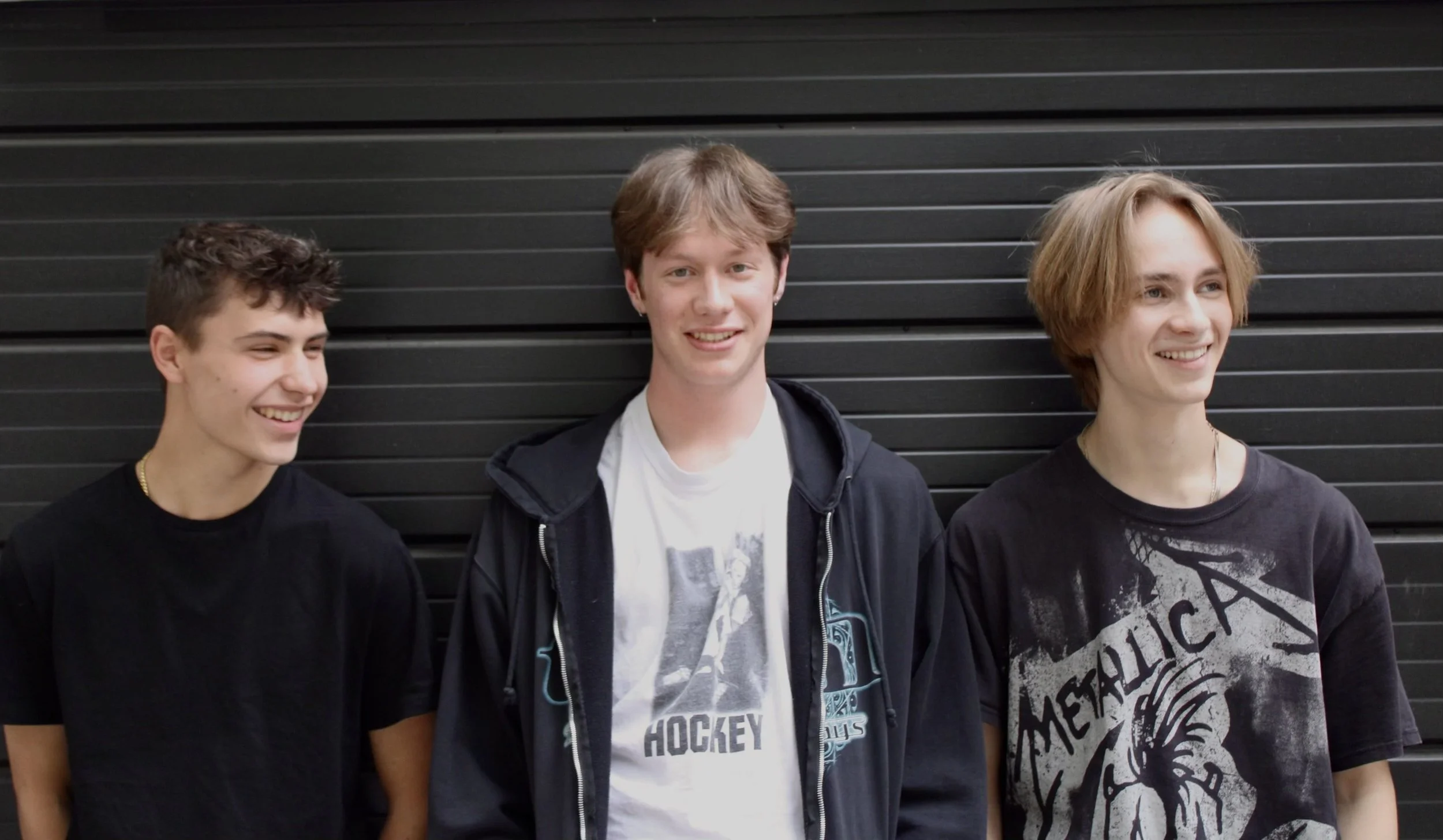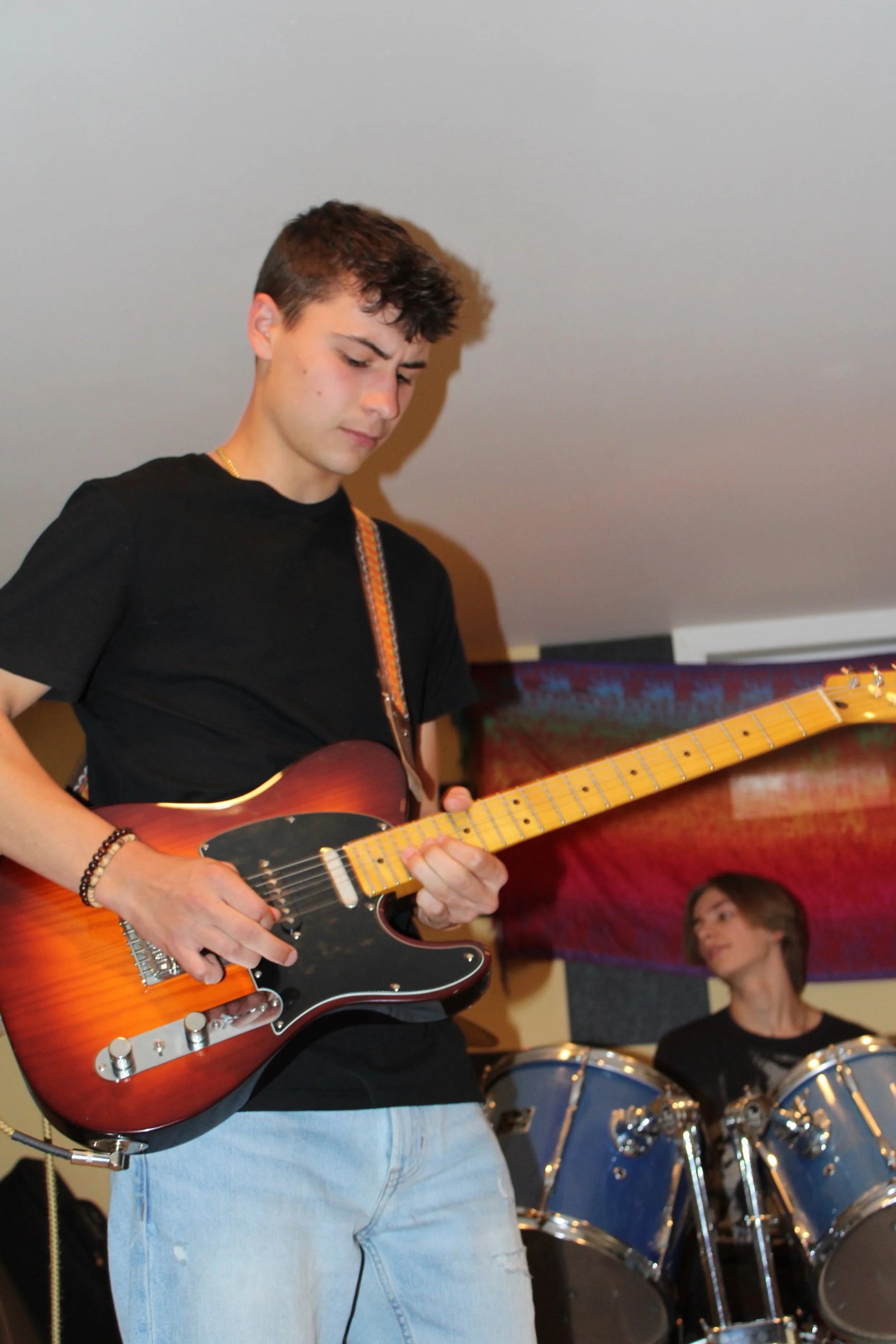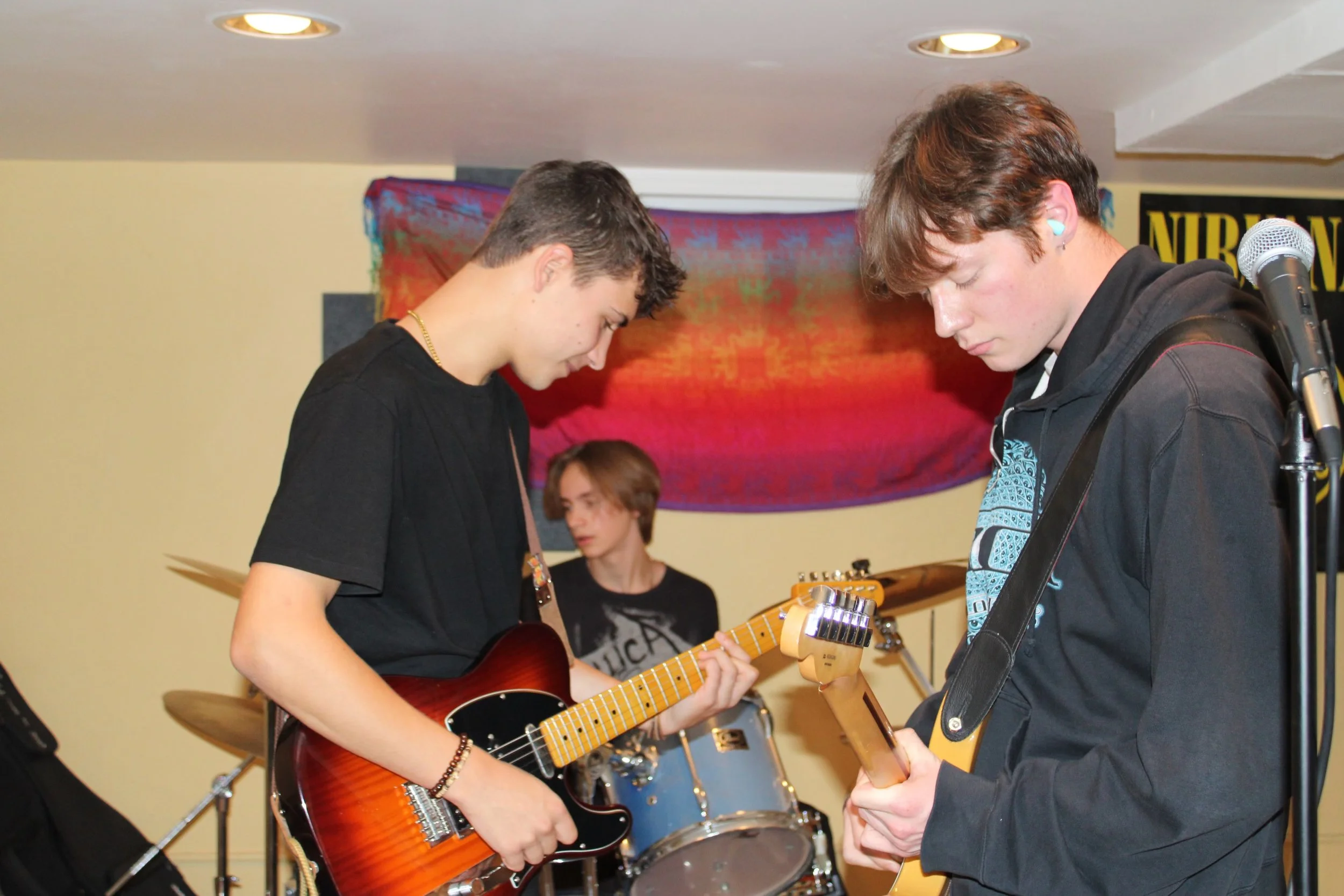The Last Three Standing: An Interview with Shady Angels
by Anna J. Wren
“It all started because I was like ‘That guy’s kinda weird. I don’t really know Jameson, so I’ll give him a shot’,” Brayden Moore recounts on the beginnings of his band Shady Angels.
He sits with his bandmates Owen Sonntag and Jameson Sanborn, three across, on a small couch, in a basement room full of instruments, band posters, and a large, green “Slow, Children at Play” sign, a reference to their past as a six-piece under that name. Laughter erupts as they recall the time when they didn’t yet know each other.
He continues, “I remember going home and I was like, this is the coolest thing I’ve ever done.” After hearing about their first exposures to music, it seems inevitable that the band sitting in front of me would have formed.
“As a second grader, I thought electric guitar was really cool,” Owen Sonntag says when asked about how he got into music.
Moore immediately jumps in as his memory is jogged, “My dad had this old guitar he got in college, and he would keep it upstairs. I would just go up there, and I was like four years old, and I would just detune all of it… and he would get really mad at me but I was always just strumming along on it, you know? I was always kind of interested.”
The excitement about music is contagious as they reminisce.
“I learned drums when I was in first grade, but I didn’t really follow up until probably freshman year of high school,” Jameson Sanborn, the resident drummer, recalls as he sips from a can of Barq’s root beer. “Owen hit me up and was like, ‘We should start a band dude!’, and him and I would jam in my garage for a year. We were trying to get the band thing going for a while, and it kind of petered out if I’m honest.”
Sitting in their practice room feels like more of an afternoon kickback than an interview for a school newspaper, as their causal authenticity immediately grounds the room.
The large green sign to my left serves as an elephant finally being addressed. Pointing to it, Sanborn says “We knew that Slow, Children at Play was kind of a wack band name for a while, but when we first came up with it, it was a joke.”
Moore’s dad originally proposed the name to him casually in the car. “We were driving down Havanna and Glenrose, like way out, I used to live over there, when we saw one of those signs,” Moore points at the sign beside me again. “And my dad said ‘Slow, children at play.”
From there, the name was “brought before the council” over group chat where the joke “stuck for too long.”
It was the transition into a four-piece, which includes the remaining three students and the bassist, Owen Swanson, who recently departed for college, that provoked the want for a name change.
“We were trying to figure out a name for like, four months. Like from when it was snowing out until June.”
Following in the footsteps of Radiohead, they gathered their new name by looking through song lyrics. Sanborn found the lyric “shady inference” while listening to TOOL, he explains while gesturing to his bandmate beside him who is wearing a sweatshirt bearing the band’s name.
Moore found “angels” listening to something off of TOOL’s first album, and it seemed like the best thing they had come up with so far.
“We were trying things like Calypso, and what other ones? Moon Junkies? I hated that,” Moore says while Sanborn produces a list on his phone to read from, “There was Cable Brains, Arson Fire, Black Hole Machines…”
Laughter erupts again across the couch.
Moore is the one that pulls the group back together this time, “We came up with Shady Angels, and it still kinda hasn’t stuck for me, but Slow, Children at Play didn’t stick for me for like the first six months.”
When asked to describe their sound, Sonntag beats the other guys to the punch. “I would say it's like a mix between 90’s alternative rock and grunge.”
“I think the direction that we’re trying to go is alternative rock, a little heavy, a little indie… We try to branch out, and I don’t really want to put us in one specific little peg here, but I definitely am trying to emulate a lot of grunge,” Moore adds.
They list off some of their biggest influences, the grunge and rock bands piling up in the conversation as evidence of their musical style. Soundgarden, Alice in Chains, Nirvana, and Pearl Jam—as they list them off, I attempt to locate posters of the bands on the walls around us.
Being in Washington, it makes sense that a high school grunge band could find creative success, as Spokane is just four hours away from Seattle—also known as “grunge mecca.”
Moore also mentions Elliot Smith as a large inspiration for his writing.
“I wrote every lyric and every main guitar rhythm part for our album, and that’s what it's been like for the last almost two years. It's just been me. I write a lot of music and sometimes I’ll think it’s bad, sometimes I'll think it’s really good, and I’ll bring it to them and be like ‘hey guys check out this riff’… and then they’ll just totally expound upon it and just build it into something that I never thought it could be.”
Moore emphasizes the collaboration that takes place after he approaches the band with a song, and Sanborn is quick to praise his skills, “Brayden is the mind behind it.”
It’s not hard to gather how well the three of them get along, and the openness between them is striking.
“We explore all the places we could go and where we could take it,” Sonntag adds.
Though the songs may start with Moore, everything on the album is a team effort. Moore is also careful to emphasize how important the guy’s contributions are to him, and how grateful he is for them.
“I mean, it’s really nice of them to be like ‘Yeah, this is really good Brayden’ and ‘Let's expound upon this’.” But there are also times when what Moore brings forth for judgment doesn’t impress, but he appreciates the honesty. “He’s [Sonntag] told me before, ‘eh, it's not my favorite, it's not that good’ and I’m like, ‘Okay thanks!”
Sanborn jumps in after him, “Because if the piece was actually bad, and we were like ‘Oh that’s good—”
Sonntag interrupts him and finishes his thought, “That wouldn’t be a good thing to do, it’s not just about being a good band member, it’s about being a good friend.”
To me, they appear more as a band of musical brothers than just three high school friends. Honesty, collaboration, and mutual support seem to be their shared mantra.
Their new album, Heirloom, focuses on themes of resilience, growing up, dealing with people (fair), and the teenage experience as a whole.
Track six on the album, titled “Rapture”, was born out of a time of struggle in Moore’s life. “‘Rapture’ is about a couple years ago when my house had a tree fall on it, and it was like, really bad. I was quite homeless, for like two years outside of this house…and I like, watched somebody die and it was quite a hard time. I was fifteen. So I wrote about that and it really shines through if you kinda pay attention a little more to the lyrics, especially in the end of the song. So that one is quite personal to me. I had a hard time talking about that for a while.”
His voice softens a bit as he speaks about it, slipping into the memory. A bit of pain still very much present in his expression.
Sonntag gently shifts the energy to talk about “Chaser,” the track that the three of them deemed their magnum opus on this album. “‘Chaser’ is a work of art. I’m still blown away every time I hear it, that it’s us, because it's pretty different than the rest of the album. It’s way more artistic. More experimental too. There’s not a true chorus to it.”
Moore seems grateful for the subject change, “It's kinda like a poem. The way I wrote the guitar part I was really ripping off Title Fight. That song is kind of a fantasy about running away and just trying to escape a lot of different things, and kind of being in your own element.”
“Chaser” represents artistic risks paying off, and the three of them seem aware and proud of this.
“I'm really happy with that song,” Moore adds.
The last track on the album, “Untitled (07)”, was inspired by an unexpected source.
“It’s the most weird origin story for a song,” Moore fights through laughter as he continues, “I was scrolling on through TikTok and I saw this video of an old cat, and it like, made me cry. And so I wrote “Grandma Kitty Cat” in like four seconds, and I was like, ‘Check this out, boys.”
The song seems to have brought comedy to the studio as Moore shares about the recording process for the song. “It took us five minutes to record, but I wanted them all to be in the booth with me at the same time because it was really funny.”
Sonntag jumps in to provide a more complete picture. “Brayden was on acoustic [guitar] and singing, and he just did it at the same time, one take… We were trying not to laugh as he was doing it.”
Sanborn joins in on the fun. “We didn’t even plan on putting it on the album, but we thought it would be so funny if we put it as the last song.”
After the contagious laughter settles, Moore continues on about the album as a whole. “We wanted to call it Heirloom because it’s like a memory passed down; it has significance. I just thought it was cool since we’re young and we can have that for a while to be passed down.”
The sentimentality associated with heirlooms definitely applies to their album, and Moore feels the need to make a closing statement on how he wants that to stick with people after listening.
“I hope people take a look at where they’re at right now and have some pride in their home, and in their hometown, in Spokane, and have some sense of youth and growing up. I wrote about resilience a lot in this album and how it can make or break you as a person. So I hope people take a second to understand a little bit about what I’m saying.”
Their next show is November 3rd at Neato Burrito, and though their eyes are on the upcoming performance, their minds are contemplating the years ahead. All three want to continue to pursue music for the rest of their lives, but they recognize with a shocking amount of realism that they won’t be a band forever.
“Ideally, we could just keep it going until we make it big, but that’s not going to happen,” says Sanborn. College, possible distance, and Sonntag being a junior at Gonzaga Prep are all obstacles to the band continuing past next fall.
Yet, none of them seem too discouraged by this, especially Sonntag. “For me, I’ve got different plans really. I want to go to Nashville to write and produce music. That’s what I want to do with my life.”
Although they are aware that they might be parting ways in the not-so-distant future, Moore also remains optimistic about their friendship, “We know that we’re going to know each other for the rest of our lives, so we’re not too concerned about that.” With somewhat limited time, they seem unbothered by what could be interpreted by some as a deadline on their dreams for this band.
“We’re just excited to see how this next year pans out for us. I mean a year ago we were kinda struggling. We had barely written anything new and we had heard rumors of a show coming up and everything, but we still had our big band. And to think that we went from having six members, to having four, and then to writing a whole album, producing it, and getting it out that summer in a little less than a year later, it showed us what we really can do if we really just shut the heck up and get stuff done,” Moore states matter-of-factly.
“We have to speak about music with complete honesty,” says Sanborn.
It’s their philosophy on music and collaboration as a band, but it also reflects the honesty with which they’re approaching their looming transition into adulthood and away from what they clearly hold very close to their hearts.
They may not know where the next few years will take them, but it seems that, when it comes to the band, they at least know this: things don’t have to be eternal for them to be great.





